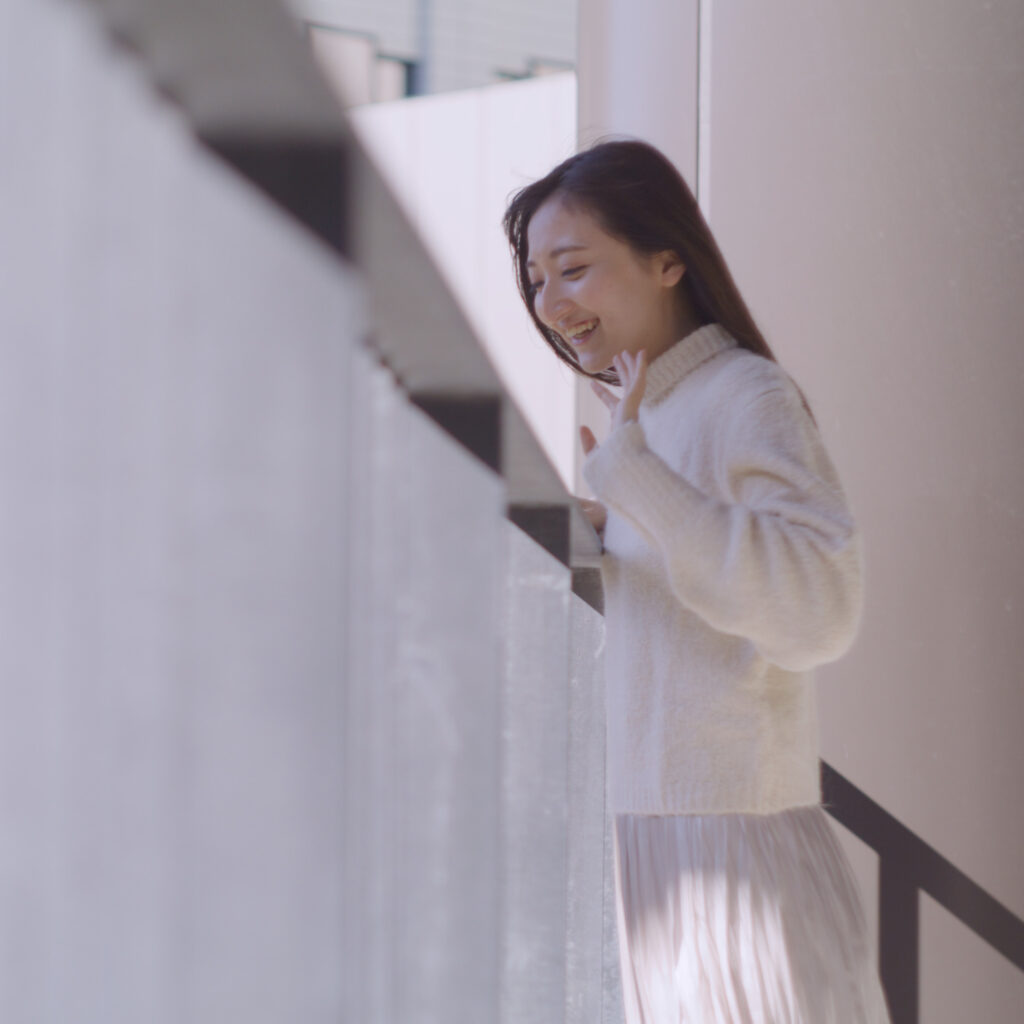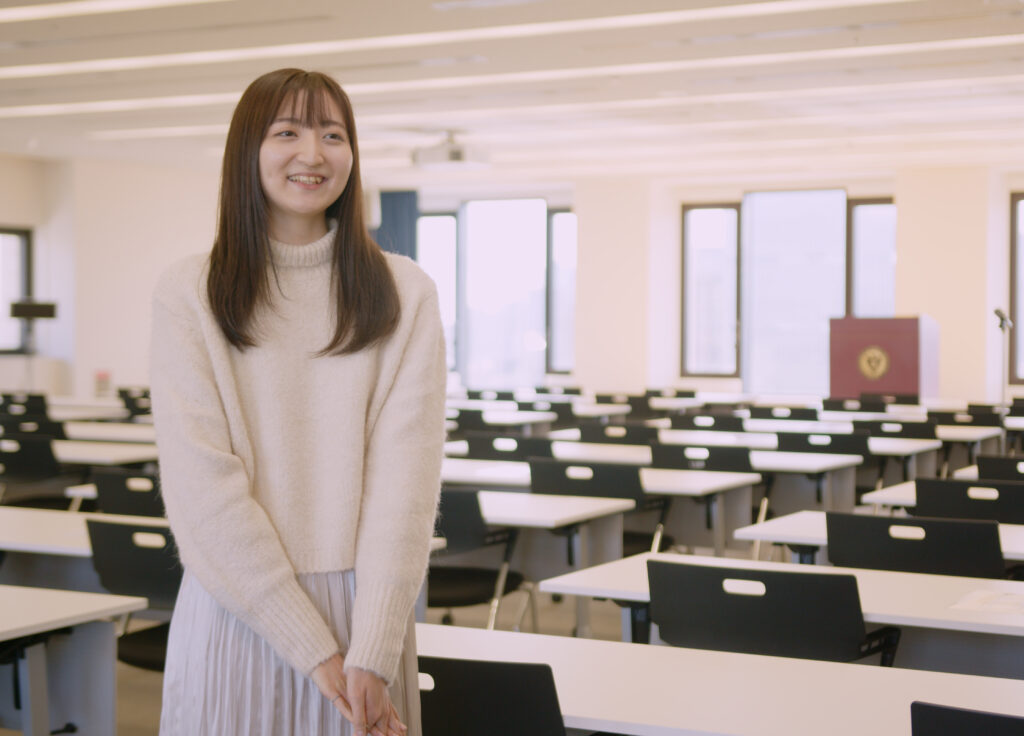Evolving with education, originality in learning

“I want to be a warm person who can make the people around me as happy as possible,” says Nokko Nagata, a senior in the Department of Education. What is the form of education she hopes to create as she pursues the questions she has had since childhood from both domestic and international perspectives?
Revealing the hidden potential of education through combined studies
I believe that the Faculty of Human Sciences can be defined as a place to consider human beings from every perspective. In addition to the Department of Education, it’s also home to the Department of Psychology, the Department of Social Services, Department of Nursing, and the Department of Sociology – each with its own atmosphere and classes.
Our department’s required first-year course, “Introduction to Human Sciences,” made me think deeply about the concept of human dignity. It is a grand theme, so at first I was asking broad questions like, “What is human dignity?” However, by the end of the semester, I could see what I needed to learn in order to help create a society where each person can live life in their own way and know that their birthrights are protected.
The reason I chose the Department of Education goes back to my childhood. I attended a unique elementary and junior high school where most of the classes were hands-on learning, so I associated the feeling of fun with school and understood the potential of education from a young age. In high school, however, the focus was placed purely on studying for university entrance exams. I felt a huge gap between my experiences and began to wonder why they were so different and what were the advantages and problems of each type of education I had received. I want to find my own answers to these questions by studying a wide range of education styles and learning that will be required in our future society, and I want to think about learning that is truly enjoyable for children. With these thoughts in mind, I chose the Department of Education.
After entering the university, I realized through my studies in the department that education is also evolving. I noticed that classes like the experiential learning and active learning classes I had taken in elementary and junior high school were being created all the time.
There were also many active learning classes at the university. For example, in an educational methodology class, we were given an assignment to come up with our own ideal school and create a pamphlet promoting it. Unlike research-oriented assignments, this assignment was to create something by myself, which I really enjoyed. Through classes like this, learning about education became even more interesting, and it strengthened my desire to think about education in a way that children would really enjoy.
The Department of Education is so friendly and welcoming that everyone knows each other. Sophia University places great importance on the educational spirit of “For Others, With Others,” and I feel that the Education Department fully embraces this spirit. Many people in the department think in terms of what they can do to make others happy rather than putting themselves first, which makes for a warm and comfortable atmosphere.
Also, all of Sophia University’s faculties are located on the Yotsuya Campus in central Tokyo, making it easy for students to take classes in other faculties. Even if I take a class that does not seem to have anything to do with education, I can come up with some interesting ideas if I relate what I learn in that class to education. This has been a great advantage for me in my studies. I can now consider education from a broader perspective, linking various social issues to education and wondering what kind of educational styles would improve society as a whole.
The professors in the Department of Education take every student seriously, and respect their interests and what they want to do. Education encompasses a wide range of fields, so I think it’s possible for students to change their interests in the process of learning. That is why it is reassuring to know that there are processors who are willing to accept such changes. There are teachers who specialize in school education and curriculum development, others who specialize in comparative education from an international perspective, and others who are from overseas, making for a learning environment with truly diverse perspectives. I think the strength of Sophia’s Department of Education is that students can pursue what they are interested in while covering a variety of topics.
Learning about education in developing countries through heart-to-heart communication

I am particularly interested in education in developing countries and international cooperation. My grandparents were from Nagasaki, so I have been interested in peace and war since I was a child. When I learned about the reality that conflicts still occur everywhere in the world and that people are still suffering from poverty, I began to pay more attention to the situations in different countries and the reasons why conflicts occur. I also became interested in international cooperation in the field of education to change such situations.
I actively took classes not only on education, but also on African history and international cooperation. Analyzing education from the perspective of international cooperation and researching the differences between Africa and Japan in the field of education, I began to see things from multiple perspectives. I feel that if you study what you are interested in, you can create your own unique learning experience, and you can develop your own originality.
I had the opportunity to think about education with students from developing countries in an online class called COIL (Collaborative Online International Learning), in which we study together with students from overseas universities. What resonated with me the most was the joy of spending time together and creating something with people who have completely different ways of thinking from my own. Even cleaning time, which is a normal part of school life in Japan, would be met with questions like “what the heck is that?” How can we truly understand each other when there are people who have backgrounds that we cannot even imagine? In the process of researching and working on this issue, I learned the importance of communicating not only in English but also from the heart and soul, and I think I have acquired that skill.
Driven by the desire to help others
Sophia University is truly an international university, with opportunities to travel abroad for study trips and internship courses, as well as many global-focused events. There are also many international students on campus, and it is not unusual to see students wearing traditional African clothing, so I take advantage of this environment to remind myself to stay attuned to international issues on a daily basis.
Because of my interest in foreign countries, I also work as a helper to support students in the SPSF program (Sophia Program for Sustainable Futures), which allows students to earn a degree in English. Students from various backgrounds come to study at Sophia University from overseas, so while there are many new discoveries for them to make by living in Japan, it is also an opportunity for us helpers to meet students from all over the world. It is exciting to think that the number of SPSF students will increase in the Department of Education in the future, making it an even more vibrant place of learning than it is now.
On the other hand, I also had the opportunity to learn about domestic issues through the Sophia Volunteer Network, a club I have been a part of since my freshman year, which regularly distributes homemade rice balls to homeless people. Since I am from Kyoto, I had the image that Tokyo was a glittering metropolis, but I was surprised to see that there were homeless people right next to high-rise buildings. I realized that there are many social issues that can be hard to see, even when they are close to my own home. It was an experience that will benefit me in the future to realize that if I take action to address these issues myself, society will improve in some small way.
In the future, I would like to become a warm person who can make people around me as happy as possible. First, I would like to work in a job related to education and developing countries to gain a wide range of experience, then it would be nice to become a school teacher who can pass on her experiences to others.
※Please note that the content of this article is current as of November 2021